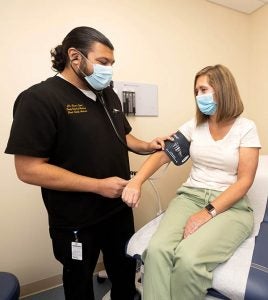RURAL FAMILY MEDICINE RESIDENCY
New program helps ECU, Vidant train physicians to better serve rural communities
East Carolina University’s Brody School of Medicine and Vidant Health have launched a new Rural Family Medicine Residency Program that will equip physicians with specialized training in caring for patients in rural and underserved communities.
The program is designed to give recent medical school graduates interested in serving as family medicine physicians in rural communities first-hand experience in caring for patients in the kind of under-resourced settings they plan to practice in upon completion of their residency training.
“Rural health care is under duress and our rural communities need solutions,” said Dr. Michael Waldrum, dean of the Brody School of Medicine and CEO of Vidant Health. “This is another great example of Vidant and Brody coming together to understand what the community needs are and creating new pathways to educate physicians to meet the community’s needs and improve the health and well-being of those communities.”
The residents will spend a majority of their first year of training at Vidant Medical Center and ECU’s Family Medicine Center in Greenville. They will then spend the next two years training in either the rural Hertford County community of Ahoskie — at the Roanoke Chowan Community Health Center and Vidant Roanoke-Chowan Hospital — or in Duplin County at Goshen Medical Center in Beulaville and Vidant Duplin Hospital in Kenansville.
This will expose the residents to the breadth of family medicine — in both resource-abundant academic medical center environments and resource-scarce rural environments — so they are well-prepared to provide comprehensive care in a variety of practice settings.
“By being embedded in these communities, they can learn what resources they have as providers, which is vastly different than the resources that are available in large metropolitan areas, and also what social determinants are affecting the health in those communities,” Waldrum said. “Understanding the intimate relationship between those two parts will give our physicians in these programs the ability to find solutions and be most effective in their careers in serving rural communities.”
According to the Association of American Medical Colleges, more than 65 percent of physicians who completed family medicine residency training between 2010 and 2019 are still practicing in the state where they did their residency training.
ECU and Vidant officials hope the new rural family residency program will help increase the supply of talented family medicine physicians in eastern North Carolina’s underserved communities.
“Practicing family medicine in rural settings like this is a bit of a calling; you have to want to do it. It’s not always easy, but it is rewarding, and you feel like you probably make a difference most days,” said Dr. Danny Pate, a site director for the residency program who has been practicing family medicine in Duplin County for nearly four decades. “So hopefully by providing these residents with training that gives them a true feel for what it’s like, it will entice them to stay in some rural setting here.”

Dr. Raza Syed, one of the first residents in ECU and Vidant Health’s new Rural Family Medicine Residency program, examines a patient at Roanoke Chowan Community Health Center in Ahoskie.
Dr. Amy White-Jones, a native of the rural Alexander County town of Taylorsville, was one of the four family medicine residents chosen for the program’s inaugural cohort out of a field of nearly 100 applicants.
“When I was growing up, we didn’t really have great access to health care, and so I grew up realizing that the underserved populations are the ones who I want to serve,” said White-Jones, who will complete her residency training in Duplin County. “There are not a lot of people who are fighting for them and saying, ‘Hey, I want to figure out a way that we can make your health a priority.’ That’s why I want to do rural medicine.”
In addition to the opportunity to care for underserved communities, Durham native Dr. Raza Syed said he chose to pursue rural family medicine because it offers the opportunity to perform more of a variety of procedures. Patients in rural areas often do not have access to as many different specialists as people in urban communities, he said, so rural family medicine physicians typically must be more versatile.
“Family medicine really gives us the opportunity to touch these communities that really don’t have the access to the resources or the number of physicians who may be available to other areas,” said Syed, who will complete his residency training in Ahoskie. “And this program does a wonderful job in terms of exposing us to a lot of different learning experiences. It gives us the chance to take what we learn in the larger academic medical center and bring it out to the rural areas, so when we see our patients in the rural clinics, we can use the knowledge that we gain and apply it to improve their outcomes.”
As of 2019, more than half of East Carolina University’s medical school graduates were practicing in North Carolina and more than half of those graduates were in primary care practice. Waldrum said the new rural family medicine residency program could help the Brody School of Medicine be even more successful in meeting its mission to increase the supply of primary care physicians that serve the state and improve the health status of residents in eastern North Carolina.
“We have many examples of Brody graduates who have navigated themselves to serve in rural settings. But this program is us, as a school of medicine and as a health system, coming together to remove barriers and create that opportunity for others,” Waldrum said. “Student success and regional transformation is really what this is all about. And this is such an important initiative and opportunity to really have impact in our rural communities across eastern North Carolina.”
